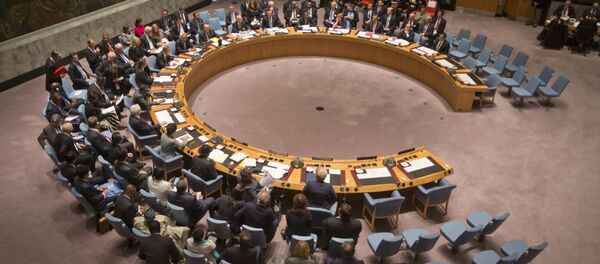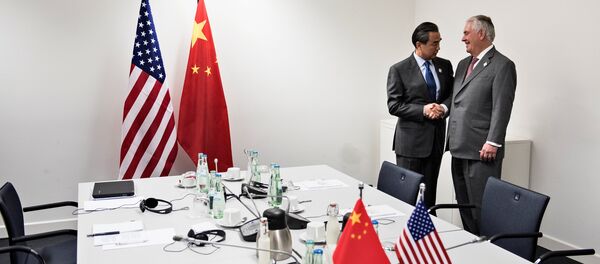On February 28, China and Russia vetoed the UN resolution drafted by Britain, France and the US to impose sanctions on Syria over the alleged use of chemical weapons by the Assad government. Bolivia also voted against the resolution while Kazakhstan, Egypt, and Ethiopia abstained.
Earlier on Tuesday, Russian President Vladimir Putin warned that by imposing sanctions on Damascus the international community would hinder the ongoing political process.
"As for sanctions, I think that it is totally inappropriate in relation to the Syrian leadership because it would not help the negotiations process, but would only hurt or undermine confidence in the course of this negotiations process," Putin said.
Explaining Beijing's veto vote Chinese Ambassador to the United Nations Liu Jieyi drew attention to the fact that the investigation into the use of chemical weapons in Syria has yet to be completed.
"At present, investigations on the use of chemicals as weapons still go on; therefore, it's too early to reach the final conclusion. The Council should preserve its unity and continue to support JIM [Joint Investigation Mechanism]," Liu said.
Both Moscow and Beijing came under heavy criticism from the draft resolution's co-sponsors.
"It is a sad day on the security council when members start making excuses for other member states killing their own people. The world is definitely a more dangerous place," Nikki Haley, US Ambassador to the United Nations, commented on the vote, as quoted by Reuters.
"Russia and China made an outrageous and indefensible choice today," Haley said.
Russian Deputy Ambassador to the United Nations Vladimir Safronkov rejected the allegations.
Speaking to journalists, Safronkov called attention to the fact that the UN draft resolution was founded on insufficient and biased evidence.
"Conclusions of the Joint Investigation Mechanism lack convincing evidence that could serve as grounds for accusations," Safronkov said.
"The problem is that Syria experts' investigation is based on disputable data provided by the armed opposition, sympathetic international NGOs, media and the so-called 'friends of Syria'," he underscored.
Commenting on Haley's remarks Safronkov noted that God will judge those who make insulting statements against Russia, China and other countries.
Speaking to Sputnik Chinese, Li Weijian, a professor of West Asian and African Studies at the Shanghai Institute for International Studies, pointed out that it was the fifth veto imposed by China over Syria's affairs.
"This was China's fifth veto in the UN Security Council on Syria. However, China's position on the Syrian crisis remains unchanged. [Beijing] has consistently advocated resolving the crisis through dialogue, negotiations and ceasefire," Li told Sputnik.
But that is not all. Li believes that some states are deliberately trying to exclude the legitimate Syrian government from the talks.
"A number of states are obviously trying to exclude the Syrian government from the dialogue conducted by the parties to the conflict. If this draft resolution in its current form was adopted before removing all its ambiguities, it would inevitably have a negative impact on future negotiations and the political process in Syria," the Chinese academic stressed.
"Therefore, it means that China has once again contributed to the Syrian political settlement," Li said, referring to the veto vote.
Russian expert on South Asia and the Middle East Stanislav Tarasov agreed that Beijing's foreign strategy towards Syria and its legitimate government has always been consistent.
In his interview with Sputnik Chinese, Tarasov explained that there are two parallel trends in China's Middle Eastern policy.
On the one hand, Beijing continues its cooperation with Moscow on the Syrian issue; on the other hand, China pursues its own geopolitical interests in the region.
"Now, when the Americans began to voice anti-Iranian statements, China gets the opportunity to strengthen its position towards Iran in resolving the Syrian crisis. There are objectively favorable conditions for the Moscow-Tehran-Ankara alliance to settle the Syrian crisis. But this format at the same time binds Russia, because Iran is demonstrating its own ambitions," Tarasov suggested.
According to Tarasov, China may also initiate separate talks on the Middle East with the US, as Beijing is not bound by any coalition promises.
The Russian expert believes that Beijing will jump at the opportunity to bolster its position in the Middle Eastern region during the upcoming talks between Chinese President Xi Jinping and Saudi Arabia's King Salman bin Abdulaziz Al Saud.
At the same time, US President Donald Trump's foreign strategy towards Syria as well as the prospects of the Russo-American collaboration in the region remain unclear. The question arises, whether Beijing will join the potential US-Russian coalition or will conduct an independent foreign policy on Middle Eastern affairs.





